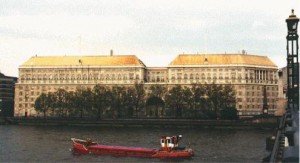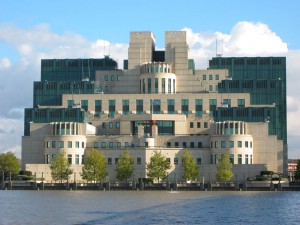This interview by E Jane Dickson was published in The Independent newspaper in January 1999, and covers the time “on the run”, the failed extradition attempt, and living in exile in Paris.
The pale noon of Paris fails to penetrate the hotel lobby where David Shayler is waiting. It is not a fashionable establishment; rather, one of those rackety joints where Anglophones gather to swap memories of Hershey bars and HP sauce. But, for the professional couple in the back booth, this is both a refuge and an operational HQ. This is where Annie Machon stayed when she came to visit David Shayler in gaol. This is where they gather their friends and resources and try to work out how on earth Shayler is going to get home.
 Last November, when David Shayler walked free from La Sante prison, he looked like New Labour’s worst nightmare: an unreconstructed hairy lefty in a Middlesbrough FC shirt, shouting the odds about freedom of information in our brave new Britain. The French court had refused to extradite Shayler, a former MI5 agent who blew the whistle on incompetence in the Security Service, on the grounds that his revelations were a political act. He is, for the moment, a free man, but should he set foot outside any French border, it is understood that the extradition process will start all over again. “It could be worse,” says Shayler, on the way to lunch at a nearby restaurant. “lt could have been Belgium that I wasn’t extradited from.”
Last November, when David Shayler walked free from La Sante prison, he looked like New Labour’s worst nightmare: an unreconstructed hairy lefty in a Middlesbrough FC shirt, shouting the odds about freedom of information in our brave new Britain. The French court had refused to extradite Shayler, a former MI5 agent who blew the whistle on incompetence in the Security Service, on the grounds that his revelations were a political act. He is, for the moment, a free man, but should he set foot outside any French border, it is understood that the extradition process will start all over again. “It could be worse,” says Shayler, on the way to lunch at a nearby restaurant. “lt could have been Belgium that I wasn’t extradited from.”
The grim humour is typical. For a man going nowhere, Shayler laughs a lot, but his eyes are deeply shadowed by 18 months of uncertainty. In August 1997, five months after the left the Service, Shayler decided to speak out against the culture of obsessive bureaucracy and bungling he had witnessed in MI5.
In an article in the Mail on Sunday he alleged that secret files had been held on prominent Labour politicians, including Jack Straw, Harriet Harman and Peter Mandelson. For many, this revelation was so unsurprising as to be hardly worth breaking the Official Secrets Act for. In the late Seventies and early Eighties, the thrilling prospect of your very own MI5 file was all too often the prime reason for joining university Labour clubs. It was enough, however, for the Government to slap an injunction on the Mail on Sunday to prevent any further revelations and for Shayler to skip the country with pounds 20,000 from the Mail on
Sunday for expenses.
Much more damaging were Shayler’s subsequent claims that the Government had been party to an assassination attempt on Colonel Gadaffi, the Libyan leader, something the Foreign Office strenuously denies, and that the Government had had prior warning of
terrorist attacks including the bombing of the Israeli Embassy in Kensington Palace Gardens and the IRA bombing of the City of London. Because of a chain of incompetence within MI5, Shayler alleged, these warnings were not acted upon, resulting in avoidable injury and loss of life.
“I’m not a spy and I’m not a traitor,” says Shayler. His words are measured and inflected, like a mantra or confession of faith. “I’m not a spy and I’m not a traitor. I simply raised issues that I believe are of great importance to the nation. If I had wanted to be a traitor,
it would have been very easy for me to do it while I was in MI5. I could have sold information for millions of pounds and nobody would have been any the wiser. I didn’t do that because I believe in standing up for what I believe in.”
The Government, however, takes a dim view of Shayler’s patriotic principles and has pursued him with the full weight of international law. After a year on the run, when they buried themselves in rural France, Shayler and Machon were tracked down to Paris where he was appearing on the David Frost breakfast programme. Shayler was watching Middlesbrough play on satellite television when he was arrested. Two months in prison gave him plenty of time to consider his position, and he paces his argument like a marathon runner who knows every inch of the track.
Occasionally, however, he gathers a head of outrage that sends him pumping for the finishing line. “At one point,” he says, pink with indignation, “it looked like I was going to be extradited and General Pinochet wasn’t. Jack Straw stood up and said that they were thinking about sending Pinochet back to Chile on compassionate grounds. I read that in a French newspaper, in a French prison, and I was thinking ‘this is absolutely ridiculous’. This is a man who has murdered and tortured thousands of people. I have written a
bloody newspaper article and he {Straw} is going for me and not for this other guy. IRA prisoners are being released, people who have been in campaigns to murder people, and yet I’m being hounded for telling the truth.”
David Shayler hardly fits the perceived idea of a secret agent. Born in Middlesbrough and educated at state schools and Dundee University, he was part of MI5’s redbrick recruitment drive, a post- Cold-War initiative to democratise the Security Service. He applied for the job through the careers pages of The Independent in 1990. “Are you waiting for Godot?” ran the enigmatic advertisement, which stressed the need for people with interviewing and analytical skills.
Shayler, who had previously failed to complete The Sunday Times graduate training
programme, thought that he was applying for a job in newspapers. In the course of his second interview, he explained how, as editor of his university newspaper, he had courted controversy by publishing the banned text of Spycatcher. This information, which might have given less subtle minds pause for thought, did not deter his future employers.
Shayler rose, not rapidly, but respectably through the ranks. He met Annie Machon, a Cambridge graduate with an impeccable service record, in the MI5 library and, by 1997, the couple were sufficiently disaffected to leave and find jobs “outside” as management consultants.
 “The obvious question,” says Machon, a neatly glamorous woman in ankle-length fake fur, “is why didn’t I blow the whistle when I had been there even longer than Dave? I know exactly what he’s talking about and so do a lot of other people there. They all agree with him but most people just say, ‘Well, you can’t change the system,’ and quietly leave to go on to other jobs. At the time, I really didn’t want Dave to go public. I knew what it would mean for us and I asked him not to do it. But in the end,” she says, threading her fingers round Shayler’s, “somebody has to stand up and be counted.”
“The obvious question,” says Machon, a neatly glamorous woman in ankle-length fake fur, “is why didn’t I blow the whistle when I had been there even longer than Dave? I know exactly what he’s talking about and so do a lot of other people there. They all agree with him but most people just say, ‘Well, you can’t change the system,’ and quietly leave to go on to other jobs. At the time, I really didn’t want Dave to go public. I knew what it would mean for us and I asked him not to do it. But in the end,” she says, threading her fingers round Shayler’s, “somebody has to stand up and be counted.”
Shayler seems faintly bewildered by the drubbing he has received at the hands of a free press. Much has been made of a quote by Shayler’s old headmaster, who remembers a clever boy who liked to “sail close to the wind”. “The papers just fell for this idea that because somebody was slightly rebellious when he was 17, he must be Public Enemy Number One,” says Shayler. The same teacher, pressed for further details of Shayler’s
contribution to school life, recalled a creditable performance as a madman in the school play. “The Sunday Telegraph ran a piece saying ‘Shayler was a madman’ and when my mum, who has been a Telegraph reader all her life, wrote to complain, they ran another photo with the caption, ‘Mummy’s Boy’.” Shayler spreads his curiously cherubic hands,
the soft, scrubbed paws of a choirboy, with nails gnawed to the quick. “You just can’t win.”
If Shayler is bewildered by his media image, Machon is “bloody furious” about it. “The name-calling makes me so indignant and it’s so personal. Dave is a big, well-built chap, and this is used against him, as if a heavy build is somehow morally dubious. It’s medieval,” she murmurs, gazing over to the flying buttresses of Notre Dame, “on a par with saying a hunched back is a sign of wickedness”.
Certainly the articulate and easy-humoured man on display today bears no resemblance to this shambling bogey of the Right. If he didn’t know the rules of engagement before, he certainly knows them now, so why on earth did he choose to have his image flashed
around the world in that filthy old football shirt? For the first time this afternoon, Shayler seems rattled. “I did it for the obvious reason that I wanted to stick two fingers up at ‘them’ and I thought that was the best way of doing it.” Annie sighs and pleads prettily for a spoonful of Shayler’s tiramisu. A woman less in love might have settled for a kick on the shins.
Whatever else it is, this is one hell of a love story. It has been said that Machon, the daughter of a Guernsey newspaper editor, is Shayler’s best asset, and while she spits fire at the idea, Shayler is the first to agree.
“Without a shadow of a doubt,” he says, “I couldn’t have done it without Annie. We have always had a very close relationship and this is the biggest and most controversial thing that came into it. When I was just starting with the whole idea of going public, Annie didn’t want to know about it; not because she was frightened for herself, but in case things went wrong, so that she couldn’t say anything that might damage me. That did put a bit of a
strain on our relationship, but the way it’s worked out has made us much closer. By far the worst thing about being in prison was being away from Annie. Not being able to hold her or kiss her; it sounds incredibly corny, but it was like a physical craving.”
It is the kind of closeness few couples could withstand. Since Shayler’s arrest, the
two go everywhere together, even to the shops for their morning baguette. When they were hiding out in la France profonde, 30km from the nearest train station, they often wouldn’t see another soul for days on end. “Fights were just impossible,” recalls Annie. “I’d stamp my foot and say, ‘Right then, I’m going … I’m going … up the lane.’ ”
Right now the big problem is finding reasons to get up in the morning. There is a limit to the number of romantic walks a couple can take, even in Paris. Neither has a job and funds are running low; to be precise, they have pounds 5,000, a gift from Shayler’s parents. Both speak competent French — Shayler’s improved dramatically while he was
in prison — and Shayler talks about taking up teaching English as a foreign language. They have found a cheap studio flat, but it is a temporary measure; soon they will need to apply for a Carte de Sejour, a permit to stay in France, and for that they will need proof of
income.
At the moment, they give shape to the week by regular visits to one of Paris’s Internet cafes, where they correspond with friends and supporters in Britain, and WH Smith, where they bone up on day-old news from home. There are almost daily calls to Liberty, the British civil liberties organisation, which has taken up Shayler’s case. Parisians,
Annie is pleased to report, have been amazingly friendly, not at all the stand-offish stereotype, but following family visits at Christmas the couple now find themselves feeling rather flat.
Shayler misses Middlesbrough FC and proper fried breakfasts; Annie misses having her
own things about her. After their Pimlico flat was raided by Special Branch, their worldly goods were parcelled out to friends and relatives around the UK. “You just don’t expect to be still living like students when you’re in your thirties,” she says. “There is a basic human need to settle down, which you don’t really understand until it’s denied you. And even though Dave is ‘free’ in France, we’re constantly looking over our shoulders. You never know if you’re being followed. And even if you’re not, the paranoia is exhausting. I think people underestimate what fear does to you on a daily basis. There were huge periods when we were absolutely terrified. “The one good thing to come out of all this,” jokes Machon, summoning feminine vanity like a reminder of normality “is I’ve lost loads of weight.”
The paranoia is understandable. While Britain may not want to do a deal with Shayler,
he remains vulnerable to other, possibly less scrupulous, agencies, who could use the information he is party to. “Our lives are far more like something from a Le Carre novel now than they were when we were working for MI5,” says Shayler, who started a novel of his own while he was in prison. He knows, however, that any work of fiction with the faintest reference to his former life will be injuncted before you can shake a Martini.
Meanwhile, his negotiations with the Government appear to have reached stalemate. The Parliamentary Intelligence and Security Committee has refused to hear his evidence and the Home Office has stated that while Shayler “insists on immunity from prosecution as his price for settling the civil proceedings, an agreement will not be possible”. For Shayler’s part, he has offered to return the money he received from the Mail on Sunday, some pounds 40,000 in total (hardly a sum to retire to Rio on). He also knows that any further revelations will risk redoubled attempts for his extradition, but he is running out
of ideas. “I said no new revelations,” he points out, “but that’s not a position I can maintain for ever.”
For all his bravura, you feel that in his heart, Shayler still can’t quite believe that the Government doesn’t care what he has to say; they just don’t want him to say it. And it is surely not unreasonable to expect more from a party that ran its Opposition on a civil liberties ticket. Most galling of all is the knowledge that if he had made his disclosures before the Conservative government tightened the Official Secrets Act in 1989, he could have cited the public interest defence which existed then and was only repealed after strenuous opposition from the Left.
“It is a matter of record that Tony Blair, Jack Straw and John Morris, the Attorney General, all voted against removing the public interest defence precisely because it would deter political whistleblowers,” explains Shayler. “So why have they changed their stance now they are in government? It seems there is no longer any embarrassment threshold in
these matters.”
Still he hasn’t given up hope — he still has his Middlesbrough FC season ticket. For Machon, without such an incentive, the prospect is not so bright. “I’m not sure how easy we’d find it to settle in England now, after everything that has happened,” she says.
“I’ll fight for the right for Dave to go back, but I’m not sure I want us to stay once we get there.” The point is, in any case, academic. “I can only assume,” says Shayler, with obvious hurt, “that the Government is quite happy to let me rot out here. I suppose they think that maybe I’ll just shut up and go away.”
The problem, both literal and metaphysical, is that Shayler simply has nowhere to go. So he might as well take the scenic route. He gathers Annie into him and their shadows merge on the grey bank of the Seine as they stroll, slowly, back the way they came.
 SOCA is a relatively new agency set up in 2004 to police organised crime, particularly that revolving around the illegal drug trade. The agency has the misfortune to have as Chairman Stephen Lander, erstwhile boss of MI5; a man whose management style was known as “Stalinesque”.
SOCA is a relatively new agency set up in 2004 to police organised crime, particularly that revolving around the illegal drug trade. The agency has the misfortune to have as Chairman Stephen Lander, erstwhile boss of MI5; a man whose management style was known as “Stalinesque”. 







